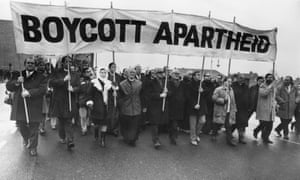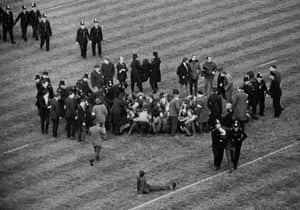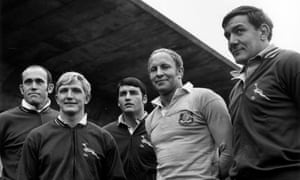The Breakdown | Protests, politics and a bus hijack: the rugby tour that gave Mandela hope | Sport
The tour that changed international sport ended 50 years ago. South Africa, No 1 in the world now and vying with New Zealand for supremacy then, returned home after four torrid months in Britain and Ireland when they were dogged by anti-apartheid protests and failed to win any of their four Tests.
It was a rude awakening for the vast majority of the squad who had little experience of the world outside their homeland, their isolation fostered by the lack of television in the country.
Europe was emerging into the world of colour at the end of the 1960s, but black and white in South Africa amounted to a political system that was abhorrent in a world that knew the power of protests.
The Springboks, as Chris Schoeman shows in his book on the tour, Rugby Behind Barbed Wire (Amberley, £20), were innocents abroad. There were exceptions, such as South Africa’s vice-captain Tommy Bedford, who studied at Oxford University and warned at the official reception on the eve of the squad’s departure that what lay ahead would probably be reflected in results.
“If we did not win all our games or even lost Test matches because none of us would have had any idea of how to cope with this additional demonstration phenomenon, the people back home and those in the comfort of the function room should remember this,” he told Schoeman. “That went down like a lead balloon.” A later speaker implied that Bedford was being disloyal.

Fifty years on, Bedford lives in London. He was so changed by the tour – identifying with the aims of the protestors to undermine apartheid through sporting isolation, if not all their methods, one of which involved the commandeering of the squad’s coach when they were on board before a match and crashing it into parked cars – that after his Test career ended in 1971 he committed himself to political change in South Africa.
He was interviewed by the Rugby Paper last November, after Siya Kolisi, the first black captain of the Springboks, had held aloft the World Cup in Yokohama and spoken movingly about his hope that rugby would help unify a divided nation. Those protesting in 1969-70 – the Stop the Seventy Tour was chaired by Peter Hain and one of the organisers in Scotland was Gordon Brown – were written off by the rugby media here as idealists and do-gooders, irritants who did not understand rugby union’s fraternity.
If any of the reporters watched last year’s World Cup, they should by then have come to appreciate not only what the protest was about but that politics and sport were not mutually exclusive, not least because governments such as South Africa’s in the apartheid era used sport for sustenance; and it was South Africa who blocked Basil D’Oliveira after the Worcestershire all-rounder was called up as a replacement for the MCC’s 1968-69 tour, saying it was a politically motivated selection when it seemed that his original omission was exactly that.
“We knew that no other country could afford a tour like this,” said Bedford last year. “That was the catalyst for change in a radical way. When I got back to South Africa from the UK I took time out. I went to a deserted part of the country and I thought about Peter Hain, Bernadette Devlin and all those anti-apartheid people who put us in this laager [camp]. I came to the conclusion that maybe they did have a point.”

Schoeman largely concerns himself with the tour itself, his book ending with a short chapter entitled Aftermath. He interviewed several of the South Africa squad, including Bedford and the captain, Dawie de Villiers, who was to serve on Nelson Mandela’s first cabinet following the fall of the apartheid regime, as well as a player from each of the four home unions: the Springboks lost against England and Scotland before drawing with Ireland and Wales and were beaten by Oxford University, Newport and Gwent in the first two weeks of the trip.
Mandela was on Robben Island when the matches were played. A news blackout for the prisoners was undermined by the warders, who were unable to hide their frustration at both the results and the protests. “It was as if Mandela and his comrades were to blame,” said Peter, now Lord, Hain. “His apartheid jailers were beside themselves with rage and that gave him a glimmer of hope.”
The protestors succeeded in forcing the postponement of one match, Ulster, while the opener against Oxford University, which was played exactly 50 years before South Africa’s victorious 2019 World Cup squad returned home, was switched from Iffley Road to Twickenham on police advice. Protestors who invaded pitches in the early matches were often dealt with by stewards, not always leniently, prompting the government to decree that only the police could take such action.

Personal memories of the tour are disappointment that Cardiff were overwhelmed by players who were far bigger than the usual opponents at the Arms Park. The politics went over the head of a young boy whose questions were to find answers later as rugby, showing its amateur status then, continued to maintain links with South Africa: New Zealand, France, England, South America, Ireland and the Lions all toured there at least once up to 1984. The visit of the Springboks to New Zealand in 1981 sparked protests that rivalled 1969-70 and two matches were called off.
New Zealand were due to visit in 1985 but their tour was called off after a high court ruling that it would contravene the union’s stated purpose of fostering and encouraging the game of rugby. The Cavaliers went there the following year, for money according to reports. It was apartheid’s last, laboured gasp, strangled by the sporting boycott.
• This is an extract from our weekly rugby union email, the Breakdown. To subscribe, just visit this page and follow the instructions.
